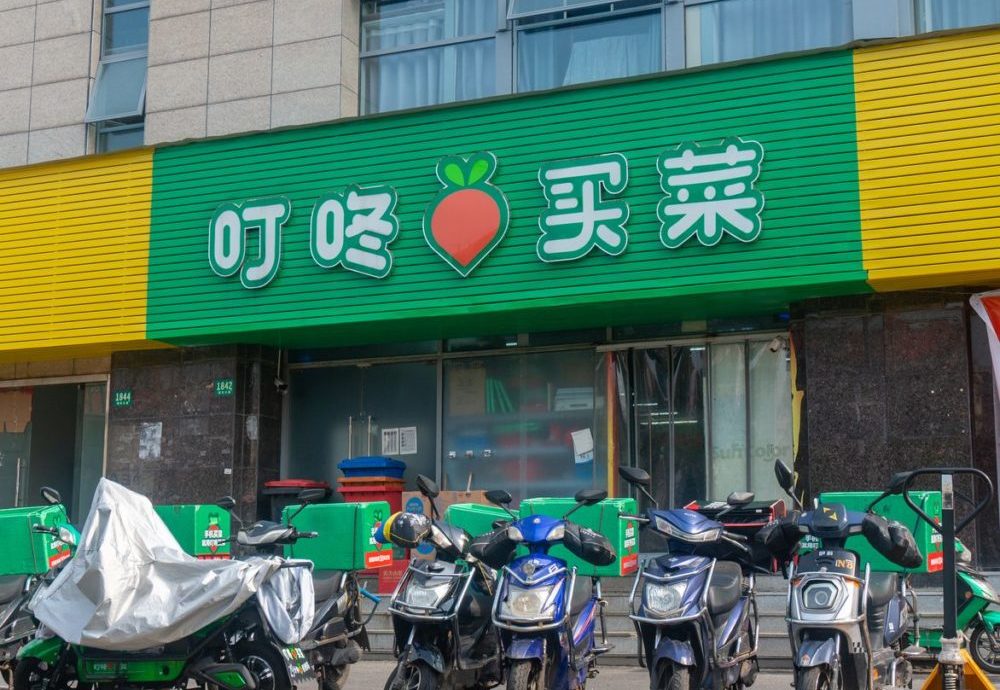Dingdong Maicai has downsized its upcoming New York Stock Exchange IPO, cutting its fundraising goal by three quarters from the $357 million target it had set in a filing with the US Securities & Exchange Commission last week to $94.4 million.
The Shanghai-based online grocery platform said it now aims to sell 3.7 million American depositary shares (ADSs) in the range of $23.50 to $25.50 per share, down from the 14 million ADSs it had originally earmarked for sale within the same price range.
The change of heart follows the disappointing Nasdaq debut of rival Chinese e-grocer Missfresh late last week. The Beijing-based company saw its shares open 18% below their lower-end asking price of $13 per ADS on Friday, closing Monday 32% down at $8.84 per share.
Investors appear to have been put off by the medium-term prospects for the companies, which are yet to turn a profit and face mounting costs in China’s ultra-competitive online grocery space. (Dingdong founder Liang Changlin has described China’s increasingly crowded e-grocery segment in military terms, saying that his company’s “barrage must be unrelenting [and its] reactions must be fast.”)
Both Missfresh and Dingdong rely on localized fulfillment models based on ‘distributed mini-warehouses’ (DMWs) and physical storefronts, which enable faster delivery to consumers but are expensive.
According to Arun George, an analyst at Global Equity Research who publishes on market insights platform Smartkarma, Missfresh benefited from Covid-19 as many consumers found themselves stuck at home amid lockdowns, or erred against venturing out to stores. Instead, they turned to online platforms to fulfill their food and grocery needs.
However, some of that pandemic-fueled boost now appears to be waning, and Missfresh’s performance since the first quarter of 2020 has been “lackluster” as competition has amped up and some shoppers have returned to their old offline habits, George adds.
Moreover, well-capitalized competitors such as Pinduoduo and Meituan are expanding their footprint in the e-grocery space, having launched express delivery services Duo Duo Maicai and Meituan Maicai over the past year or so.
Even at the height of the pandemic in China, Missfresh was unable to generate a profit in the peak demand quarter of Q1 2020, George says – and with demand now “normalizing,” the company’s path to profitability looks “highly uncertain.”
There are longer term issues, too. “[It’s] market share has more than halved since 2018. Missfresh ranked first in China’s on-demand DMW retail industry in 2018 and 2019, respectively, and ranked second in 2020 as measured by GMV [gross merchandise volume],” he says.
“Worryingly, Missfresh’s market share more than halved from 58% in 2018 to 23% in 2020, in part due to higher competitive intensity.”
When the company debuted in New York last Friday, the market clearly decided that it had overvalued itself in light of some of these concerns.
It would appear that Dingdong has opted for a massive share price cut in advance of its own IPO in order to avoid the same reaction from the market.
While Dingdong has seen its market share increase 4x since 2018 — in contrast to Missfresh — it has still seen cash burn and fulfillment costs mount over time, according to George.
Douglas Kim, an independent analyst publishing on Smartkarma, says that Dingdong’s competitors such as Meituan and Pinduoduo are “much larger companies with greater economies of scale [and] profitability.”
But he adds that Dingdong generated “tremendous” sales growth last year, with the US’s DoorDash the only comparable business globally to clock higher sales growth over the same period.
He also suggests that technology could play a key role in weighing the Chinese e-grocers’ costs and revenue in the future.
“A lot of this [business is] likely to be more data-driven with increasing [use of] robotics, which holds higher potential for a speedy path to profitability in the future.”
Missfresh raised at least $800 million in venture funding last year, with Tencent, Goldman Sachs, and Abu Dhabi Capital Group among its investors.
Dingdong closed a Series D round last month which saw it raise over $1 billion from SoftBank’s Vision Fund, Coatue Management, General Atlantic, and Sequoia Capital.
The most recent edition of AgFunder and AFN‘s China Agrifood Startup Investing Report found that the eGrocery category – comprising companies selling produce and other groceries online and delivering them to consumers – raised $3.6 billion in total in 2020, making it the country’s single highest-funded category. [Disclosure: AgFunder is AFN‘s parent company.]





